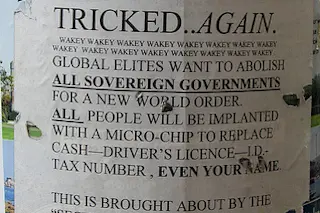Photo: flickr/kyzEvery family has one. You know, the person who is always going on about how the moon landing was a hoax, or that the government is covering up something about the JFK assassination. But why is it always that person? What makes them more likely to believe in conspiracy theories? Well, these scientists have a hypothesis, and I bet it's not one these conspiracy theorists want you to know about.Does it take one to know one? Endorsement of conspiracy theories is influenced by personal willingness to conspire. "We advance a new account of why people endorse conspiracy theories, arguing that individuals use the social-cognitive tool of projection when making social judgements about others. In two studies, we found that individuals were more likely to endorse conspiracy theories if they thought they would be willing, personally, to participate in the alleged conspiracies. Study 1 established an association between conspiracy beliefs ...
Friday Flashback: What conspiracy theorists don't want you to know.
Explore the endorsement of conspiracy theories and how personal willingness to conspire influences belief in them.
More on Discover
Stay Curious
SubscribeTo The Magazine
Save up to 40% off the cover price when you subscribe to Discover magazine.
Subscribe













